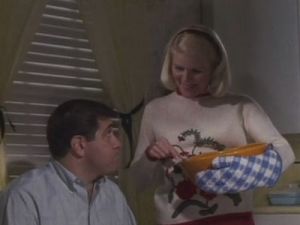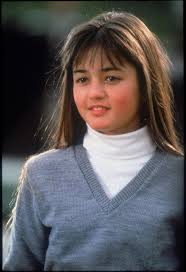A ritual my wife and I often do after putting the kids to bed is watch a TV show together. With most of the current TV shows being subpar, and since we recently cut our cable, we decided to go with an older show. Our app “Kodi” has an infinite number of TV shows and we agreed to watch The Wonder Years as we both have fond but vague memories of the show.
The six seasons of the show ran from 1988-1993 but takes place from 1968-1973. It may have run longer but even in the early 90’s Hollywood got an early glimpse of the destruction from the #MeToo movement. The first five seasons brought about your typical comedy, but the sixth and final season brought about truths that many in the manosphere know.
Jack and Norma Arnold

Jack you worked so hard today, I made your favorite dessert!
Jack (Dan Lauria) and Norma (Alley Mills and the late Andrew Breitbart’s mother in law) are your prototypical American couple. Born and raised during the era of the Great Depression, they display conservative values but have faced newfound difficulties raising their Baby Boomer children.
Season 6 sees a shift in character for Norma. She spent the first five seasons being the super stay-at-home mother. By the early 70’s—and spawned on by the feminist movement—she feels the need to seek something more “meaningful.” With their youngest child, Kevin, a year from graduating high school, she no longer believes that being a housewife will bring her happiness. Feminism told her that she would be empowered by getting into the working world. Shortly after, you see the order the Arnold house fall apart. Not many would foreshadow the effect a two-parent working household would have on the family, but at least she raised her kids to 17 before falling into the traps of feminism.
On the other hand, Season 6 sees Jack take a positive spin for his career. The first five seasons he was busting his back in the corporate world but decides to become the owner of a furniture store. You see his character become lighter-hearted in season 6, and that could be because of the sense of fulfillment that he finally had in being self-employed. ROK has been at the forefront of advising men to stop working in the corporate world and start working for yourself.
When I originally watched the series, I could really only relate to Kevin Arnold and his peers. It was sobering to find out that this time around, I actually related to his parents just as much as the teenagers. Jack came from the “Silent Generation” and his mentality was not to speak out against the rebellion of social norms. This mindset is what allowed the hippies to flourish and basically turn this country into what it is today. By the time he tried to reign in on his teenage daughter’s behavior in seasons 1-4, it was pretty much too late. It serves as a stark reminder for me as a father of two young kids about how important it is to be active during the formative years of their lives.
Winnie Cooper and Hypergamy

et tu Winnie?
If you were a red-blooded American preteen/teenage male in the late 80’s to early 90’s, you probably had a crush on Winnie Cooper (Danica McKellar). Kevin (Fred Savage) and Winnie have been going out off and on since Junior High. A brief change in Winnie’s attitude toward Kevin is apparent in the last few episodes of the series.
Kevin scores a respectable 1240 on his SAT but Winnie scores over a 1450. Winnie now has an abundance of college options, but her longtime boyfriend will most certainly not get accepted into whatever college she chooses. Then Kevin makes the mistake of telling Winnie that they should take a “break”. If Kevin would have had access to the manosphere in 1973, he would know that a cute 17-year-old female has way more options than an average 17-year-old male. Within the same episode, she ditches Kevin for a tall handsome Chad of a lifeguard. Even the sweet, little Winnie Cooper cannot resist the traps of hypergamy because AWALT.
Wayne Arnold

Who that is, that’s just my baby daddy
Wayne (Jason Hervey) portrays every terrorizing, annoying older brother perfectly. He graduates high school at the end of season 5 and we see a different side of Wayne in season 6. He starts to change when he meets the 23-year-old Bonnie. On the surface, things seem okay, but it turns out Bonnie is a recent divorcee with a 6-month son.
Wayne’s parents try to appear nonjudgmental but they express their concerns about this relationship to Wayne. The red flags were there: the divorce, child, and jerk husband, but Wayne was blinded and ultimately gets his heart broken when she leaves him to get back with her ex-husband. In 1973 this was so out of the norm that a majority of men may have white-knighted to help this damsel in distress. To this day there are countless average men who have made the sacrifice and taken on the role of a stepdad, only to have this taken away from them as their partner leaves him for her ex-con/loser baby’s father.
Rewatching the whole series reminded me of how great of a show it was when it was on, especially season 6 because of the situations described from above along with other subjects like veteran PTSD, the losing connection of a childhood friend in Paul Pfieffer, etc. Of course, having red pill knowledge makes you evaluate these situations with stronger insight.
The era was the start of a lot of downturns in our society, but people still had that genuine friendliness of them that has almost all but evaporated 45 years later. Living in an era where people lived with gender roles clearly defined can truly be referred to as “The Wonder Years.”
Read More: Modern Movies Suck: A Tale Of The Two Total Recalls